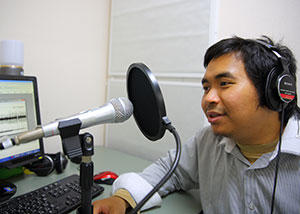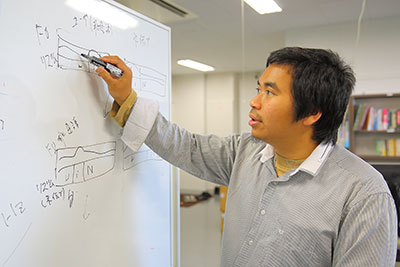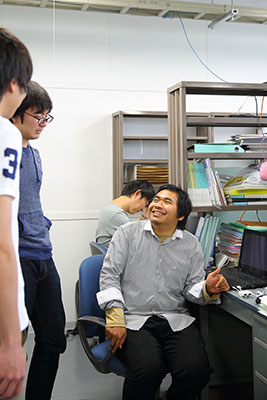- HOME
- Student Interview: Hafiyan Prafianto (Indonesia)
Student InterviewHafiyan Prafianto (Indonesia):
Gaming Japanese Language

I come from Tangerang, a city in Indonesia. I have been fascinated with Japan since childhood because of some Japanese anime aired in Indonesia. This included Doraemon, science fiction about a time travelling robot, which also became a reason for me to be fascinated with technology.
I came to Japan in 2007 after graduating from a madrasa on an undergraduate scholarship from MEXT. In this program, available at various universities and colleges throughot Japan, the studies are conducted fully in Japanese. Therefore, before I started my studies, I received a chance to study Japanese intensively for one year. After that, I studied information technology (computer science) in a college of technology in Yamato Koriyama, a small city in Nara Prefecture. I learnt how to program, a way maximize the potential usefulness of computers for humans.

I came to Sendai in 2013, starting my graduate program at Tohoku University in the Ito-Nose Laboratory (then Ito Laboratory), mostly by happenstance. My motivation for continuing on to graduate school was to find an application for my rather limited knowledge of computer science.
In Sendai, I met many other international students. The scale of the international community was something that I could not imagine while I was living in Nara. Many of them do not have enough time to study Japanese, and only speak and understand limited Japanese. Even though most of them do not face great problems in their studies, which are conducted mostly in English, not understanding enough Japanese may create many problems in their daily lives.

Finding solutions to reduce this language barrier has been a purpose of my research. In my master research, I tried to find the ideal condition (how fast to speak, where to pause, etc.) to facilitate the ability to understand spoken Japanese.
In my doctoral research, I am currently trying to develop software to be used in computer assisted language learning (CALL). Examples of how CALL programs can be used to help foreign language learning include programs to help learners to memorize vocabulary, collections of audio files to train listening comprehension, and many others. I believe that the spread of mobile computing, including smartphones, is an important factor that can be exploited by many people to make more time to study language. This can help international communities better connect with local communities, and help both communities to better understand each other.
